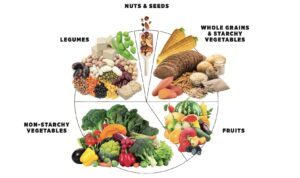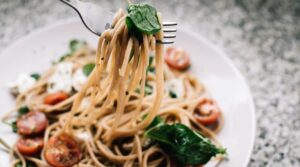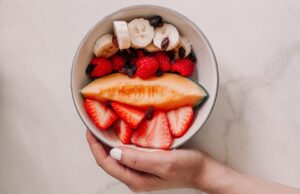
Dr Heleen Roex-Haitjema


In the fast-paced and demanding world we live in, finding moments of stillness and calm can be challenging. In an attempt to find a little peace...
If you want to get your gut in order, Dr Will Bulsiewicz is the expert to help you sort out fact from fiction. This is the gut-health cheat sheet...
Crunchy, nutty, and subtly sweetened with maple syrup, this gluten-free buckwheat granola makes a sustaining and delicious breakfast or anytime...
Welcome in winter with these deliciously sweet, wholesome, and warm scrolls – a perfect treat for morning or afternoon tea.
It doesn't get much simpler or more delicious than this dish. You'll make a fantastic gluten-free crispy tortilla from scratch and, while you're...
Strawberries are simply lovely in a salad and contrast beautifully with the black rice in this one to make a gorgeous-looking dish. Finished off...
This green tempeh Buddha bowl is super easy to make and packed full of protein. The perfect fuel for your day!
Like a green smoothie but in the form of an ice block – how great is that? These ice pops are like little pieces of magic on a very hot day.
Spraying sheets and pillows with calming scents can be a wonderful aid to slumber
The next time you go for a walk, discover the wonder of the everyday world around you
A skincare routine can be a way to nourish yourself inside and out
When the clouds converge, practise gratitude for the smallest of glimmers, and learn to dance in the rain.
The four fundamentals of healthy eating aren’t complicated at all. Discover how easy it can be to nutrify your diet.
Plant-based eating is catching on at an increasing pace, and for good reasons: personal health, reducing our environmental footprint, and compassion for animals are all powerful motivators. From a health perspective, saying goodbye to animal products is a fantastic step. Even lean, white, or unprocessed meats are laden with saturated fat. Plus, animal products are the only source of dietary cholesterol and contain a host of inflammatory compounds proven to contribute to chronic diseases such as heart disease, diabetes, and common cancers.
By choosing plant foods instead, we give ourselves a tremendous head start in both maintaining and regaining good health through all life stages. But establishing a healthy plant-based dietary pattern can be a challenge, especially when we are used to a standard Western diet, and the lure of convenience foods is ever-present.
So, let’s simplify everything and focus on nutrifying your diet. These fundamentals of healthy eating will help you and your family take advantage of an abundant, life-affirming wholefoods approach to plant-based eating.

A wholefood, plant-based way of eating makes vegetables, fruits, whole grains, and legumes the stars of your plate. Keeping these in their pure state or minimally processed retains all their nutrients, taking advantage of your body’s natural mechanisms such as feeling satiated, stabilising blood sugar levels, and promoting healthy gut flora, which has numerous knock-on benefits for your overall health.
A great rule of thumb is to fill half your plate with vegetables and fruits and the other half with whole grains, starchy vegetables (such as potato, sweet potato, pumpkin, and peas), and legumes (such as lentils, beans, and chickpeas). Nuts, seeds, herbs, and spices can be used in smaller quantities for additional flavour and texture.
Like any new undertaking, there’s plenty to learn before eating this way becomes a habit, but the good news is that once you’re on a roll it becomes second nature, so persistence pays off. As you focus more on wholefoods, you’ll notice that your cravings change, too. Your taste buds will adapt, and your gut microbes will no longer respond well to processed, packaged, or animal-based foods. It’s a self-sustaining cycle, and you’ll see the rewards are worth it!
A few meal-planning basics can make including more wholefoods in your diet so much more manageable and enjoyable. A great starting place is to ‘plantify’ some familiar recipes. Perhaps spaghetti bolognese transports you back to your childhood happy place? This is a perfect example of a dish that is even tastier as a plant-based version. Adapting old favourites will help you establish a repertoire of trusted dishes, and there’s no shortage of recipes you can look to for inspiration and guidance.
If you include ‘wholefood, plant-based’ or ‘WFPB’ in your searches, you’ll be well on the way. When planning for the week, consider dishes that can be made in larger quantities so that there is plenty for a couple of dinners or leftovers for work lunches. Freezer-friendly recipes are great candidates for double batches as they can be frozen for another time, making for a ready-to-go nutritious meal whenever you need it. You can even prep up healthy breakfasts such as overnight oats or chia puddings, which are perfect options for making ahead of time.
Once you’ve got your recipes sorted for the week, it’s a great idea to jot down your shopping list before heading to the markets or grocery store. Having a list with you will avert those impulse purchases and ensure you have the right ingredients on hand at home, making it much easier to follow through on your good intentions.

Remember, vegetable oils are not wholefoods, therefore are not recommended as part of a wholefood, plant-based diet. For example, while whole olives and sunflower seeds provide a nutritious package of fibre, amino acids, vitamins, and minerals, extracting just the oil leaves behind the vast majority of these important nutrients. What remains is a concentrated source of liquid fat, shifting our calorie intake away from the healthier, complete foods.
Here’s the good news! You don’t have to give up those caramelised onions or crispy roast potatoes. With a little know-how, there are many ways to cook dishes without oil – and without sacrificing the flavour.
For any kind of pan-frying, water can be used to moisten the pan – just add a little at a time to prevent food sticking. This works so well, you’ll wonder why you ever used oil to begin with. For caramelised onions, the trick is to start by dry frying them before adding water. Add the sliced or diced onions to a hot pan and keep them moving for a couple of minutes, until they start to brown. Then, simply add one tablespoon of water to deglaze the pan, let it evaporate, and repeat while continuing to stir until the onions are soft and brown.
Roasting veggies without oil is just as easy, once you quit that habitual oil drizzle! If you’re concerned about sticking, baking paper or reusable silicone baking sheets work well, although cooking without oil actually makes for easier washing up. Just leave any stuck bits to soak and your dish will wipe clean. For oil-free roast potatoes that are golden on the outside and fluffy in the middle, parboil or steam them before roasting. Moisture is added during this step and, because the potato is cooked part of the way through already, it won’t dry out in the oven. Yum!
Intrinsic sugars, or in other words those that occur naturally in whole fruits and vegetables, come wrapped in a package of healthy nutrients, making them a welcome part of a wholefood, plant-based diet. By contrast, added or refined sugars are best kept to a minimum. In this way, sugars are similar to extracted oils versus the wholefoods the oils are extracted from.
Be aware that there are upwards of 40 types of sugars found in packaged food and drinks. Brown rice syrup, malt syrup, agave syrup, fruit juice concentrate, coconut sugar, date sugar – the list goes on, and most are no more healthful than plain old white sugar!
Ditching added sugar doesn’t mean an end to sweet treats though. For example, in wholefood, plant-based baking a cup of overripe mashed banana can be substituted for a cup of sugar, or you can use unsweetened apple sauce in the same way. In both instances, you’ll just need to reduce the other liquids in the recipe slightly to account for the moisture in the fruit.
If your added sugar intake is moderate, after about one week you’ll find you’ll have more stable energy throughout the day and the cravings will have ceased. Fruits will seem sweeter and more delicious than ever before and, if for example you opt for the occasional piece of dark chocolate, you’ll be amazed by how rich and satisfying it is in small quantities.

It’s often said that healthy eating has become too complicated and, with the masses of information at our fingertips, it is easy to get bogged down and overwhelmed. But, amidst all the claims and counterclaims, there is one simple formula that won’t let you down. Eat ‘wholefoods’ and ‘plant-based’. This is a great guide to sustainable, healthy eating that is abundant in nutrients.
This approach says a big YES to a wide variety of colourful, nutritious foods that lend themselves to limitless dishes, from familiar favourites to any number of cuisines from around the world. Not only that, when we focus on what we’re including rather than what we’re excluding, it’s easy to crowd our plate with health-promoting, wholesome foods, gradually displacing processed and animal-based foods. The added bonus: it’s a lifestyle that offers the freedom to delete that calorie or macro-tracking app and eat up!
***
Dr Heleen Roex-Haitjema will be speaking at Doctors For Nutrition’s upcoming Nutrition in Healthcare Conference, taking place in Melbourne from 17–19 February 2023. The conference will bring together leading experts on whole food plant-based eating and its positive effects on your health and the environment.
To learn more and register, visit doctorsfornutrition.org/nihc
Images: Alesia Kozik, Lisa Fotios on Pexels; Plant plate inspired by Emma Strutt APD
If you want to get your gut in order, Dr Will Bulsiewicz is the expert to help you sort out fact from fiction. This is the gut-health cheat sheet...
In the fast-paced and demanding world we live in, finding moments of stillness and calm can be challenging. In an attempt to find a little peace...
Spraying sheets and pillows with calming scents can be a wonderful aid to slumber
The next time you go for a walk, discover the wonder of the everyday world around you
A skincare routine can be a way to nourish yourself inside and out
When the clouds converge, practise gratitude for the smallest of glimmers, and learn to dance in the rain.